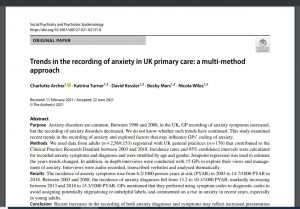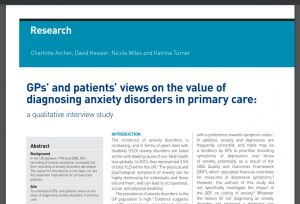Exploring trends in recording anxiety symptoms in UK primary care
4 August 2021
The way GPs record anxiety in patient records could be leading to a reduction in formal anxiety diagnoses, new research from the University of Bristol has found. Anxiety disorders are common in the UK, with the level of anxiety symptoms being recorded by GPs increasing between 1998 and 2008. However, studies have shown that the recording of anxiety disorders decreased in the same period.
The reason for this contradiction and what it means for the treatment of patients are unclear. One explanation for this disconnect could be that symptoms of depression and anxiety are often both present in patients. In many cases like this, a GP will prioritise the depression diagnosis.
The fall in recorded anxiety diagnoses may also be because GPs are reluctant to formally label patients with an anxiety disorder. They may also prefer to use broad symptom codes rather than distinguishing between the subtypes of anxiety when recording anxiety in patients’ records.
To explore this further, a team of NIHR Bristol BRC, NIHR ARC West and NIHR School for Primary Care Research funded researchers from the Centre for Academic Primary Care conducted an interview-based study. Their aim was to examine these recent trends in recording anxiety, focussing on factors that may influence how GPs code anxiety.
The researchers found that broadly GPs’ and patients’ views differed on the value of diagnosing anxiety. The trends in symptom reporting and diagnoses may reflect changes in GP recording, rather than solely a change in the number of people with anxiety.
GPs reported that they had a role in helping patients understand that anxiety is experienced by everyone at some level, preferring to use symptoms rather than diagnostic codes. They also felt assigning diagnostic codes over symptom codes could be potentially unhelpful and stigmatising for the patient. GPs also felt their limited time with patients affected their ability to recommend effective treatment for a diagnosis. They felt this was more appropriate for a psychiatrist.
Patients highlighted barriers to consulting their GP, such as not realising the physical symptoms they were experiencing were due to anxiety, and a reluctance to discuss their symptoms. Overall, the researchers found that symptom codes were used for acute and mild anxiety whereas diagnostic codes tended to be used for chronic and severe anxiety.
This research formed part of Dr Charlotte Archer’s PhD. She added:
“Our study highlights that patients would value GPs diagnosing anxiety disorders, as a diagnosis can be helpful in terms of understanding their symptoms and the need for treatment. For this to happen in practice, seeing the same GP over a period of time may be particularly important. This would encourage patients to disclose and give GPs sufficient time to discuss and diagnose anxiety disorders.
“This continuity of care may be particularly important for telephone consultations, which have increased as a result of the COVID-19 pandemic. It will be important for future research to understand if patients with anxiety have found it harder to disclose symptoms over the phone, and the impact this may have had on diagnosing anxiety disorders.”
Paper

Trends in the recording of anxiety in UK primary care: a multi-method approach
Download the paperAdditional papers
